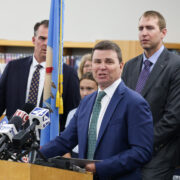
LOCAL
Dylan Goforth, The Frontier
Oklahoma State Superintendent Ryan Walters looms over the Oliver Hodge Building in Oklahoma City. Walters has defended including 2020 election conspiracy theories in the state’s new social studies standards, a move critics say politicizes the classroom. Dylan Goforth, The Frontier
Oklahoma has officially adopted new social studies standards that require public school students to be taught about “discrepancies” in the 2020 presidential election — language critics say mirrors debunked conspiracy theories.
Despite the lack of evidence supporting claims of widespread voter fraud, the state’s new standards embed references that educators and parents fear could mislead students and turn classrooms into ideological battlegrounds.
The standards include mandates criticized for their similarity to talking points from conservative media outlets rather than academically sound instruction. Some teachers and parents worry the inclusion of partisan narratives threatens the integrity of education and places pressure on educators.
Aaron Baker, an Oklahoma City-area AP U.S. Government teacher with more than a decade of experience, said that while revising academic standards is routine, this particular revision cycle felt different. He worked on the revisions, but eventually learned — election conspiracies had been added later, after the public comment period closed.
He called it a “multi-layered bait and switch,” and said the inclusion of language about the 2020 election was particularly alarming.
“When I read this section of the U.S. History standards, it looks like we could call them talking points, but it also looks like the bullet points for a nightly broadcast on Fox News,” he said.
What makes the situation even more troubling, Baker said, is the political climate in which these standards are being implemented. He pointed to increasing pressure on teachers, including threats to certifications and public shaming on social media for those perceived as not aligning with state-sanctioned narratives.
“It’s concerning, but I’ve dealt with a lot of those concerns in the past,” Baker said. “I’ve had phone calls to the principal, and I’ll just be honest with you, a lot of it has to do with where you choose to teach, and what (you teach.)”
Sandra Valentine, a mother of five and a longtime observer of Oklahoma education policy, agreed with Baker. Valentine’s daughter, Jade, will be a freshman in high school this year and will eventually be required to take U.S. History classes that include the new standards.
Valentine said her daughter watched the 2020 election unfold in “real time.”
“She’s contemplating herself, how am I going to have this conversation in a classroom setting with classmates who didn’t see everything that she saw during that 2020 election,” Valentine said.
Valentine compared the new standards with those from 2019, which she praised as some of the best in the nation. She said the contrast between what her older children learned and what Jade will be taught is stark. She’s also concerned about a lack of critical thinking in the way the standards are written. School should be a place where people’s beliefs are challenged, she said, but they should be challenged on facts.
“(My daughter is) going to come across kids and students and peers who are going to challenge her thinking,” Valentine said. “And that is what I want. I want everybody’s thinking to be challenged.”
Heather Goodenough, president of the Oklahoma Council for the Social Studies and a longtime educator, said she’s heard from teachers across the state who are worried not only about the content of the new standards, but also about the ambiguity in how they’re expected to teach it.
“It should be very objective,” Goodenough said of the social studies curriculum. “We want students to be given all perspectives and let them make up their own minds. And so with the verbiage of the added standards, it’s much more subjective, and so they are a little fearful about how to teach those.”
Valentine said her daughter is prepared for a classroom where misinformation may be taught, but she’s worried for kids who aren’t.
Despite public backlash and ongoing litigation challenging the new standards, barring legal intervention, they’re set to remain in place for at least the next six years. Advocates like Goodenough and Valentine say that awareness is the first step toward action.
“There is an opt-out process,” Goodenough said. “I think it’s important for parents and families to understand that if you don’t want your kid to learn about a particular standard or particular topic or subject, it’s okay that you opt them out.”
Oklahoma State Superintendent Ryan Walters, who is currently facing a probe after multiple OSDE board members said they saw “naked women” on his television during the last department board meeting, said in an emailed statement that Oklahoma has “the best academic standards in the country.”
“Leftist indoctrinators can no longer force-feed a woke agenda to our students, and that’s why there is such an outrage coming from Democrats. These new Standards are pro student, pro America, and pro families – everything the teachers unions seem to be against.”









